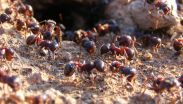(Press-News.org) An international team of researchers found that the evolutionary loss of the "altruistic" worker caste in ants is not accompanied by a loss of genes.
Social insects, such as ants, are typically characterized by two distinct female castes: workers and queens. Previous research has found that workers and queens each express different sets of genes leading scientists to speculate that there are worker specific or "altruistic" genes that promote sociality.
Testing this "novel gene" hypothesis is difficult given that all ants are social. However, not all ants make workers. Some ants are "workerless social parasites" whose queens exploit the worker force of other species by invading and setting up shop in their colonies. The authors took advantage of the unusual biology of these ants that have lost their worker caste to determine if worker genes really exist.
The research team, led by Chris R. Smith (Earlham College) and Alexander (Sasha) Mikheyev (Okinawa Institute of Science and Technology), sequenced and compared the genomes of six ants (3 hosts and 3 workerless social parasites) and looked for evidence that genes that are typically over expressed in the worker caste would degenerate through time when workers are no longer produced. Instead of finding degeneration in "worker" genes, they found that there are no "worker" genes and the majority of the protein coding genome is maintained in species that stopped producing workers even after one million years. Their research is online early in the journal Molecular Biology and Evolution.
"This was a total surprise, we hypothesized the opposite -- when you lose a trait then the genes for that trait should disappear over time," said Smith. "This result has two interesting implications: first, there don't seem to be any genes that are explicitly 'worker' and thus truly 'altruistic', and two, that the loss of an entire body plan is not accompanied by a loss of genes."
This result suggests that any organism's genome may harbor the potential to produce historic phenotypes that are no longer under selection (for ~1 million years) - one need only speculate about what ancient human traits may continue to lurk in our own genomes, waiting to be expressed in a different environmental context.
When looking across developmental stages in an ant (the red harvester ant, Pogonomyrmex barbatus), the researchers found that most genes are expressed in both queens and workers, but often at different points in development. For example, there are no uniquely "worker" or "queen" genes. They then looked at whether genes with a greater bias in workers were more likely to get lost in species that no longer produce workers (social parasites).
To do this the researchers sequenced the genomes of two host species and two of their social parasites. The answer was no, the entire protein coding genome was under selection to maintain the genes present in both hosts and workerless social parasites.
The researchers found their results so surprising that they sequenced the genomes of another host-social parasite pair in the genus Vollenhovia, which are evolutionarily independent. Once again, the result was the same. Again surprised, they tested whether they could even expect to see the deterioration of genes in the mere 700,000 to million years of divergence between worker and worker-less species. Indeed, models do predict gene loss, yet none was evident in their actual samples.
"Social parasitism is relatively widespread in social insects, and our results suggest why - most changes are regulatory, and don't require complex genome-wide alterations," Mikheyev said.
The results reported in this new research add to a growing body of literature suggesting that many traits (and whole body plans, as shown here) may evolve by tweaks in the regulation of pre-existing genes and networks. Phenotype gain and loss may be facilitated by changes in the environment within and outside of the organism, not necessarily requiring changes to protein coding genes, just changes to when and how they are used).
"This research reminds us of the importance of studying organisms with unusual natural history in order to get insight into the processes that govern diversity more generally," said Andrew Suarez from the University of Illinois and a co-author of the study.
While this work was on species far removed from the origin of sociality, it does suggest that sociality may have evolved from regulatory changes in a solitary ancestor rather than requiring novel altruism genes for social living and division of labor.
INFORMATION:
@earlham1847 END
Controlling feral pigs is the most cost-effective strategy to help save 148 endangered plant and animal species in the Lake Eyre Basin, and is just one of the significant findings of a three-year study led by QUT applied ecologist Associate Professor Jennifer Firn.
Professor Firn, from QUT's Institute for Future Environments, worked with Dr Josie Carwardine and CSIRO's Conservation Decisions team and a research team from the University of Queensland including Dr Ramona Maggini, to identify and prioritise 23 strategies to protect endemic species in the world's largest ...
Until now only known for role in polyglutamine diseases, such as Huntington's.
Scientists at VIB and KU Leuven have revealed that variable polyglutamine repeats in the DNA tune the function of the protein in which they reside. To date, these repeats were known only to cause severe neurodegenerative diseases such as Huntington's. These findings now show that polyglutamine repeats may be more than just harmful elements. The study was published in the leading molecular biology journal Molecular Cell and opens the door to further studies exploring new therapies for human ...
Widespread species are at just as high risk of being wiped out as rare ones after global mass extinction events, says new research by UK scientists.
There have been five mass extinction events in the Earth's history, including climate change caused by volcanoes and an asteroid hit that wiped out the dinosaurs.
In general, geographically widespread animals are less likely to become extinct than animals with smaller geographic ranges, offering insurance against regional environmental catastrophes.
However, a study published in Nature Communications has found this insurance ...
A natural compound called limonene, which is found in oranges and lemons, could be indicative in early-stage diagnosis of liver disease, according to research published in the journal EBioMedicine by researchers in the Molecular Physics Group at the University of Birmingham.
Limonene occurs in the greatest abundance in citrus fruits, but it is also found in a large variety of other fruit and vegetables. It can be ingested or inhaled as it is a common additive in commercial food and drinks, is used to give the fruit flavour to some sweets and is used in cosmetics, ...
Scientists at the University of Liverpool have shown that educating pet owners about canine body language may not be the answer to preventing dog bites as originally thought.
Experts have argued that dog bites are preventable if owners are properly educated on how to read canine behaviour and identify high risk situations. Until now, however, the effectiveness of this theory has not been evaluated in any great depth.
At a time when data suggests dog bite incidents are increasing, the team at Liverpool interviewed victims of dog attacks to gain further understanding ...
In 1884, a delegation of international representatives convened in Washington, D.C. to recommend that Earth's prime meridian (the north-south line marking zero degrees longitude) should pass through the Airy Transit Circle at the Royal Observatory in Greenwich, England.
(A transit circle is an instrument for measuring star positions, and could be used for determining local time; this one was named for its designer, British Astronomer Royal George Airy.)
But modern navigators, mapmakers, surveyors and London tourists now find that zero longitude runs 334 feet east of ...
Using an innovative method, EPFL scientists show that the brain is not as compact as we have thought all along.
To study the fine structure of the brain, including its connections between neurons, the synapses, scientists must use electron microscopes. However, the tissue must first be fixed to prepare it for this high magnification imaging method. This process causes the brain to shrink; as a result, microscope images can be distorted, e.g. showing neurons to be much closer than they actually are. EPFL scientists have now solved the problem by using a technique that ...
1. Clinical scoring system suggests possibility of more precise colon cancer screening
Free abstract: http://www.annals.org/article.aspx?doi=10.7326/M14-1720
Editorial: http://www.annals.org/article.aspx?doi=10.7326/M15-1677
URLs go live when embargo lifts
A clinical scoring system for colon cancer risk could help physicians identify which average-risk patients could potentially skip a colonoscopy and instead be screened with a less-invasive method. The researchers suggest that this approach could increase the uptake and efficiency of colorectal cancer (CRC) ...
Hamilton, ON (Aug. 10, 2015) -McMaster University research, published online today by the Annals of Internal Medicine, has demonstrated the benefits of corticosteroid therapy for one of the most common serious medical conditions.
"Our study should lead to an important change in treatment for pneumonia," said lead author, Dr. Reed Siemieniuk, a physician and a graduate student at McMaster University. "Corticosteroids are inexpensive and readily available around the world. Millions of patients will benefit from this new evidence."
Lower respiratory infections are the ...
DALLAS, Aug. 10, 2015 -- If your dinner plate often includes fried chicken, gravy-smothered liver, buttered rolls and sweet tea -- your heart may not find it so tasty. Eating a Southern-style diet is associated with an increased risk of heart disease, according to research published in Circulation, an American Heart Association journal.
In a large-scale study that explored the relationship between dietary patterns and heart disease risk, researchers found that people who regularly ate traditional Southern fare -- which they characterized as fried foods, fatty foods, eggs, ...



